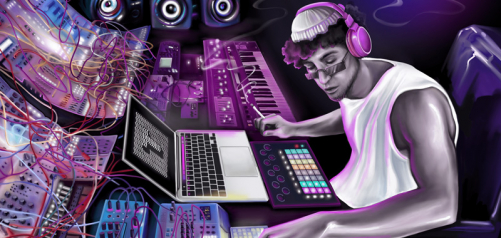MUSIC NFTS TRANSFORM LISTENERS INTO COMMUNITIES
Oct 18, 2022
The music industry has been on the decline, revenue-wise, ever since all of us collectively became addicted to the Internet. A study from the University of Dakota shows that the music industry went from $20 billion in 1999 to $7 billion in 2016.
And while we won’t lose any sleep because record executives aren’t bringing in as much money as they used to, the fact is that the entire music ecosystem is suffering. Artists are having a harder time getting signed, venues are closing down, and listeners are becoming increasingly fragmented.
Many artists are now exploring new ways to engage with their fans and generate revenue. One promising avenue is the use of music NFTs.
Social Media and Music NFTs
The rise of social media platforms like Facebook and Twitter has initially boosted the music industry by providing a new way for artists to connect with fans and promote their music.
But these platforms have been co-opted by record labels to plant the artists they’ve groomed for success while stifling the creativity and innovation of independent artists.
The same thing is happening with streaming platforms like Spotify and Apple Music. While they’ve made it easier for listeners to find new music, they’ve also created a race to the bottom regarding artist compensation.
In contrast, music NFTs offer a way for artists to take back control of their careers and connect with their fans in a more direct and intimate way.

The Web3 Music Boom
The Web3 music market has been around for the last two years. The hype surrounding NFTs and crypto has boosted the market’s value to $1.2 billion. And while the price is expected to fluctuate, the overall trend is positive.
The possibilities of music NFTs are endless, and it’s near-impossible to cover them in a single article. But still, here are a few examples of what music NFTs can do:
- Allow artists to release new music directly to their fans without going through a record label or streaming platform.
- Give fans the ability to show their support for an artist by buying virtual items like concert tickets, merchandise, or even a stake in the artist’s future success.
- Help artists fundraise for new projects or causes they care about.
Create new ways for artists and fans to interact and connect.
Transforming the Music Industry With NFTs
Funding albums with the money generated from NFT sales. Giving the fans ownership of a fragment of the album they helped finance. Allowing people to show their support in a more tangible way. And that’s far from the only potential use case.
Let’s look at a few of the most exciting projects using music NFTs to transform the music industry.
Audius is a decentralized music streaming platform that allows artists to release their music directly to their fans without going through a record label or streaming platform.
Audius is also working on an NFT marketplace that will allow artists to sell virtual concert tickets, merchandise, and even a stake in their future success.
Ujo Music is a blockchain technology project to create a more fair and transparent music industry. It allows artists to license their music and set the terms of use. It also allows fans to buy music directly from the artist without going through a third-party platform.
Let’s show some appreciation to the big labels as well. A collaborative music project formed by Warner Records and Probably nothing, Probably a Label has worked with some of the biggest acts in the music industry: Green Day, RHCP, and Led Zeppelin. Probably a Label uses NFTs and Blockchain technology to promote and distribute music in an efficient and transparent way.
Music NFTs Create Communities
While social media platforms still provide a space where fans can gather and interact, they’re still curated, filled with trolls, and ultimately under the control of a central authority.
Music NFTs, on the other hand, have the potential to create communities that are more intimate, creative, and rewarding for both artists and fans. Sharing the ownership of a song with the fans who helped create it is a much more democratic way of operating, and it gives fans a real stake in an artist’s success.
So far, we’ve only seen a glimpse of what’s possible with music NFTs. But we have a feeling that we’ll see it soon.